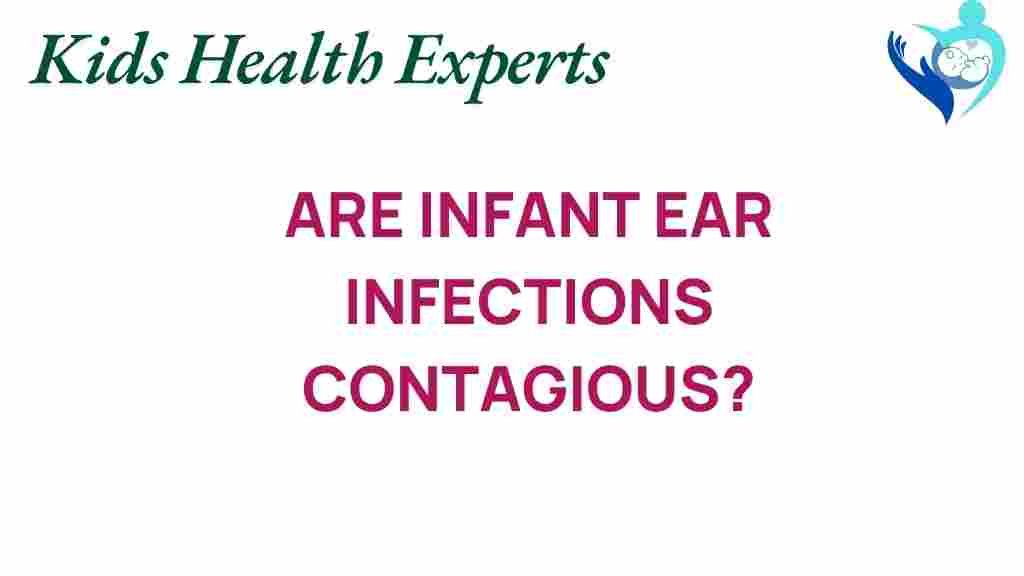The Curious Case of Infant Ear Infections: Are They Contagious?
Infant ear infections, also known as otitis media, are a common health issue affecting many children, particularly those under the age of three. As parents navigate the world of pediatric care, understanding the symptoms, treatments, and prevention strategies for these infections becomes crucial. One of the frequent questions parents ask is: are infant ear infections contagious? In this article, we will delve into this topic, providing valuable insights and guidance for concerned parents.
Understanding Infant Ear Infections
Before addressing the contagious nature of ear infections, it’s essential to understand what they are. An ear infection occurs when bacteria or viruses invade the middle ear, leading to inflammation and fluid buildup. This condition can be painful and often affects a child’s overall health.
- Types of Ear Infections:
- Acute Otitis Media (AOM): A sudden onset of infection, often causing severe pain.
- Otitis Media with Effusion (OME): Fluid accumulation without infection, which may follow an AOM.
Are Infant Ear Infections Contagious?
To answer the question directly: infant ear infections themselves are not contagious. However, the viruses and bacteria that can lead to ear infections are indeed contagious. This distinction is vital for parents to understand.
How Ear Infections Develop
Ear infections often follow a respiratory infection, such as a cold or the flu, which is contagious. Here’s how the process typically unfolds:
- Viral Infection: A child catches a virus, which may cause nasal congestion and inflammation.
- Eustachian Tube Dysfunction: The inflammation can block the Eustachian tubes, preventing fluid from draining from the middle ear.
- Bacterial Growth: The trapped fluid creates an environment where bacteria can thrive, leading to an infection.
Symptoms of Infant Ear Infections
Recognizing the symptoms of infant ear infections is crucial for timely pediatric care. Common signs include:
- Fussiness or irritability
- Pulling or tugging at the ear
- Difficulty sleeping
- Fluid draining from the ear
- Difficulty hearing or responding to sounds
- Fever
If you notice these symptoms in your child, it is essential to consult a pediatrician for evaluation and treatment.
Treatment Options for Infant Ear Infections
The treatment for infant ear infections may vary based on the severity and frequency of infections. Here are common treatment approaches:
- Observation: In some cases, doctors may recommend a wait-and-see approach, especially if the symptoms are mild.
- Antibiotics: If a bacterial infection is suspected, antibiotics may be prescribed.
- Pain Relief: Over-the-counter pain relievers such as acetaminophen or ibuprofen can help alleviate discomfort.
- Ear Tubes: For children with recurrent infections, ear tubes may be recommended to allow fluid drainage and prevent future infections.
Preventing Infant Ear Infections
While it may not be possible to prevent all ear infections, certain precautions can significantly reduce the risk:
- Breastfeeding: Breastfeeding for at least six months can provide essential nutrients and antibodies that help boost your infant’s immune system.
- Avoiding Smoke: Keep your child away from tobacco smoke and other pollutants, which can irritate the respiratory system.
- Vaccinations: Ensure your child is up-to-date with vaccinations, including the pneumococcal vaccine, which can prevent some types of ear infections.
- Good Hygiene: Teach your child proper handwashing techniques to reduce the spread of germs.
When to Seek Medical Help
Parents should monitor their child closely for symptoms of ear infections. It’s important to seek medical assistance if:
- The child has a high fever (over 102°F or 39°C)
- Symptoms persist for more than 24 hours
- Fluid is draining from the ear
- The child seems excessively irritable or in pain
Troubleshooting Tips for Parents
As a parent, dealing with an infant ear infection can be stressful. Here are some troubleshooting tips to help manage the situation:
- Comfort Measures: Use a warm compress on the affected ear to help relieve pain.
- Positioning: Elevate your child’s head while they sleep to help fluid drain.
- Medication Adherence: Ensure that you follow the pediatrician’s instructions regarding medications, including completing the full course of antibiotics if prescribed.
Conclusion
In summary, while infant ear infections themselves are not contagious, the underlying viruses and bacteria that lead to these infections can be. Parents should be vigilant in recognizing the symptoms and seek timely pediatric care to ensure their child’s health and well-being. By implementing preventive measures and maintaining good hygiene, parents can significantly reduce the likelihood of ear infections in their children. For more information on pediatric care and ear infections, visit this resource.
Remember, as a parent, you are not alone in this journey. Educating yourself about infant ear infections can empower you to make informed decisions regarding your child’s health.
This article is in the category Conditions and created by KidsHealthExperts Team
